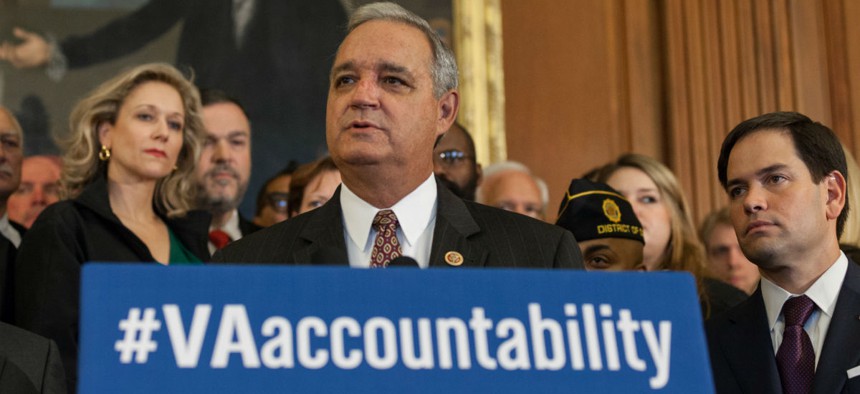
Rep. Jeff Miller, R-Fla., introduced a bill that would "provide bad actors with potent new tools for silencing dissent in their ranks," according to AFGE. Caleb Smith/House Speaker John Boehner
The Great VA Accountability Scam
The conversation about VA accountability has switched from a constructive discourse to a partisan campaign against civil service protections for front-line employees.
There were too few VA providers with too little time and too little support to provide adequate care to the growing number of veterans returning home from two foreign wars; employees who exposed this gap faced retaliation from managers more interested in looking good than doing well. This staffing crisis was at the heart of the wait list scandal that rocked the Veterans Affairs Department in the summer of 2014.
In the midst of the scandal, the American Federation of Government Employees and other stakeholders worked hand-in-hand with lawmakers to deliver legislation that would shore up the agency’s staffing levels, add clinic space and improve scheduling tools to increase veterans’ ability to receive timely care. The result was a bipartisan measure that, despite some shortcomings, set the VA on a pathway to greater accessibility and quality of care.
In the year since, however, things have taken a dramatic and dangerous shift off course. What was once a constructive conversation about improving veterans’ health care has since turned into a highly partisan campaign against civil service protections of front-line, non-management VA employees, more than one-third of whom are veterans themselves.
The embodiment of this mission creep is the misleadingly-named 2015 VA Accountability Act (H.R. 1994), introduced by House Veterans’ Affairs Committee Chairman Rep. Jeff Miller, R-Fla. If passed, H.R. 1994 would strip fundamental due process rights from every VA front-line non-management employee taking care of our nation’s heroes, making them virtually at-will employees.
The logic behind this legislation is simple: if only we can fire the bad actors, everyone will be better off, right?
In reality, the VA already takes appropriate steps to get rid of employees who are poor performers or violate the law. Last year, the VA fired more than 2,500 employees. This legislation will provide bad actors with potent new tools for silencing dissent in their ranks, punishing would-be whistleblowers brave enough to stand up for veterans’ care, and increasing discrimination against newly hired veterans and other targeted employees. We saw how long the wait list problem was able to fester using existing retaliatory techniques; imagine how fearful employees will be when they no longer have the right to gather evidence, obtain representation or make a meaningful appeal when they are terminated?
Making matters worse, the bill also lengthens employee probationary periods, making it easier for new employees to be fired without just cause. What better way to build a culture of silence and fear than to add another six months or more to an employee’s “at will” status?
The bill offers whistleblowers a very flimsy safe harbor from their new at-will status, while deluging the Office of Special Counsel with new cases and duties that will interfere with its core mission. As president of the union that stood in defense of dozens of brave whistleblowers throughout the scandal, I fear that this unprecedented attack on federal employee rights will dramatically undermine our ability to protect future employees facing retaliation, discrimination and other prohibited personnel practices.
These three ingredients -- elimination of due process, longer probationary periods, and inadequate protections for whistleblowers -- make H.R. 1994 a recipe for disaster. It would not only sustain, but expand a culture of fear and retaliation that the VA has pledged to eradicate. Diminishing the rights of VA’s front-line employees, who are the agency’s most important watchdog of mismanagement on the ground, will erase every ounce of progress made since the scandal first came to light.
It is clear that out-of-touch lawmakers and the anti-government front-groups that are driving this legislation are more interested in molding the VA to carry out their broader agenda instead of providing quality, accountable health care to our nation’s heroes.
A new vision for VA accountability is needed, one that curbs mismanagement up front, protects employees against unwarranted terminations and workplace harassment, improves investigations of mismanagement, and lends more support to the men and women who served on the battlefield and now wish to serve their fellow veterans through VA careers. AFGE encourages lawmakers to enact initiatives in line with this vision.
Our veterans deserve a system that is accountable to them and their needs, not H.R. 1994. It’s time for a real conversation on accountability.
J. David Cox Sr. is president of the American Federation of Government Employees.






